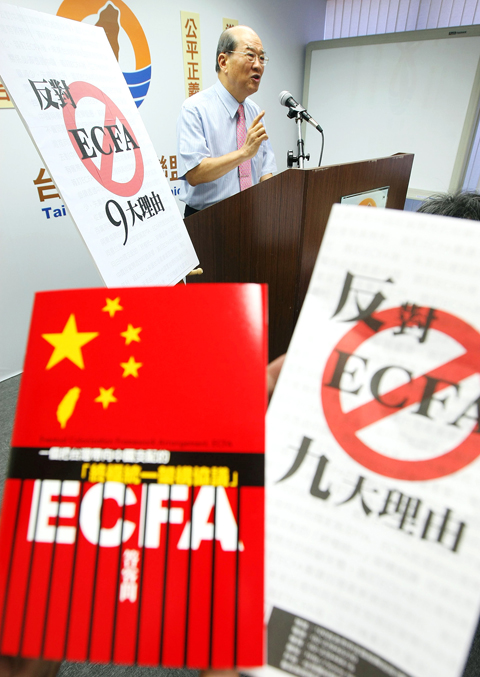The Taiwan Solidarity Union (TSU) released a pamphlet yesterday listing the ways Taiwan would be harmed if it signed an economic cooperation framework agreement (ECFA) with China.
TSU Chairman Huang Kun-huei (黃昆輝) told a press conference that the pamphlet would help the public realize the major disadvantages of an ECFA.
The TSU is cooperating with the Democratic Progressive Party (DPP) to promote a referendum on any pact, Huang said.

PHOTO: CNA
The pamphlet is written by three economists — National Taiwan University economics professor Kenneth Lin (林向愷), National Taiwan University agricultural economics professor Woo Rhung-jieh (吳榮杰) and Wang To-far (王塗發), an adjunct professor of economics at National Taipei University.
Huang said Taiwan’s industrial base had been hollowed out, unemployment had soared and wages had declined since 2001 because of over-investment in China, but President Ma Ying-jeou (馬英九) had ignored this by pushing for closer economic relations with China.
He said that after signing an ECFA with China, Beijing would control Taiwan’s trade with other countries, making Taiwan an economic subsidiary of China.
An ECFA would seriously affect Taiwan’s agriculture sector, Huang said, adding that poor quality Chinese products would inundate the local market and China would absorb Taiwan’s production technology and high quality plant and animal species.
An ECFA would be the death knell for the country’s agriculture sector, he said.
The TSU chairman said that after Hong Kong signed a Closer Economic Partnership Arrangement (CEPA) with China in 2003, its average annual salary declined from US$27,708 to US$24,244 in 2007, mainly because its manufacturing industries were forced to relocate to China.
Huang said Taiwan would not enjoy beneficial treatment along with the ASEAN-plus-China grouping under an ECFA unless Taiwan acknowledged it was a province of China.
China would continue to block Taiwan from signing free trade agreements with other countries, he said.
Making a play on the acronym, Huang described it as an Eventual Colonization Framework Agreement, adding that it was a framework agreement leading Taiwan toward ultimate unification with China.

MORE VISITORS: The Tourism Administration said that it is seeing positive prospects in its efforts to expand the tourism market in North America and Europe Taiwan has been ranked as the cheapest place in the world to travel to this year, based on a list recommended by NerdWallet. The San Francisco-based personal finance company said that Taiwan topped the list of 16 nations it chose for budget travelers because US tourists do not need visas and travelers can easily have a good meal for less than US$10. A bus ride in Taipei costs just under US$0.50, while subway rides start at US$0.60, the firm said, adding that public transportation in Taiwan is easy to navigate. The firm also called Taiwan a “food lover’s paradise,” citing inexpensive breakfast stalls

TRADE: A mandatory declaration of origin for manufactured goods bound for the US is to take effect on May 7 to block China from exploiting Taiwan’s trade channels All products manufactured in Taiwan and exported to the US must include a signed declaration of origin starting on May 7, the Bureau of Foreign Trade announced yesterday. US President Donald Trump on April 2 imposed a 32 percent tariff on imports from Taiwan, but one week later announced a 90-day pause on its implementation. However, a universal 10 percent tariff was immediately applied to most imports from around the world. On April 12, the Trump administration further exempted computers, smartphones and semiconductors from the new tariffs. In response, President William Lai’s (賴清德) administration has introduced a series of countermeasures to support affected

CROSS-STRAIT: The vast majority of Taiwanese support maintaining the ‘status quo,’ while concern is rising about Beijing’s influence operations More than eight out of 10 Taiwanese reject Beijing’s “one country, two systems” framework for cross-strait relations, according to a survey released by the Mainland Affairs Council (MAC) on Thursday. The MAC’s latest quarterly survey found that 84.4 percent of respondents opposed Beijing’s “one country, two systems” formula for handling cross-strait relations — a figure consistent with past polling. Over the past three years, opposition to the framework has remained high, ranging from a low of 83.6 percent in April 2023 to a peak of 89.6 percent in April last year. In the most recent poll, 82.5 percent also rejected China’s

PLUGGING HOLES: The amendments would bring the legislation in line with systems found in other countries such as Japan and the US, Legislator Chen Kuan-ting said Democratic Progressive Party (DPP) Legislator Chen Kuan-ting (陳冠廷) has proposed amending national security legislation amid a spate of espionage cases. Potential gaps in security vetting procedures for personnel with access to sensitive information prompted him to propose the amendments, which would introduce changes to Article 14 of the Classified National Security Information Protection Act (國家機密保護法), Chen said yesterday. The proposal, which aims to enhance interagency vetting procedures and reduce the risk of classified information leaks, would establish a comprehensive security clearance system in Taiwan, he said. The amendment would require character and loyalty checks for civil servants and intelligence personnel prior to